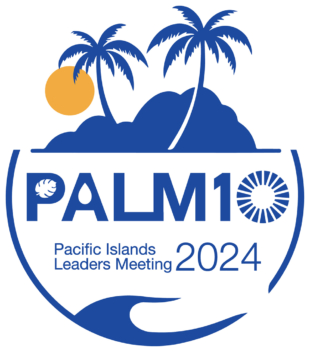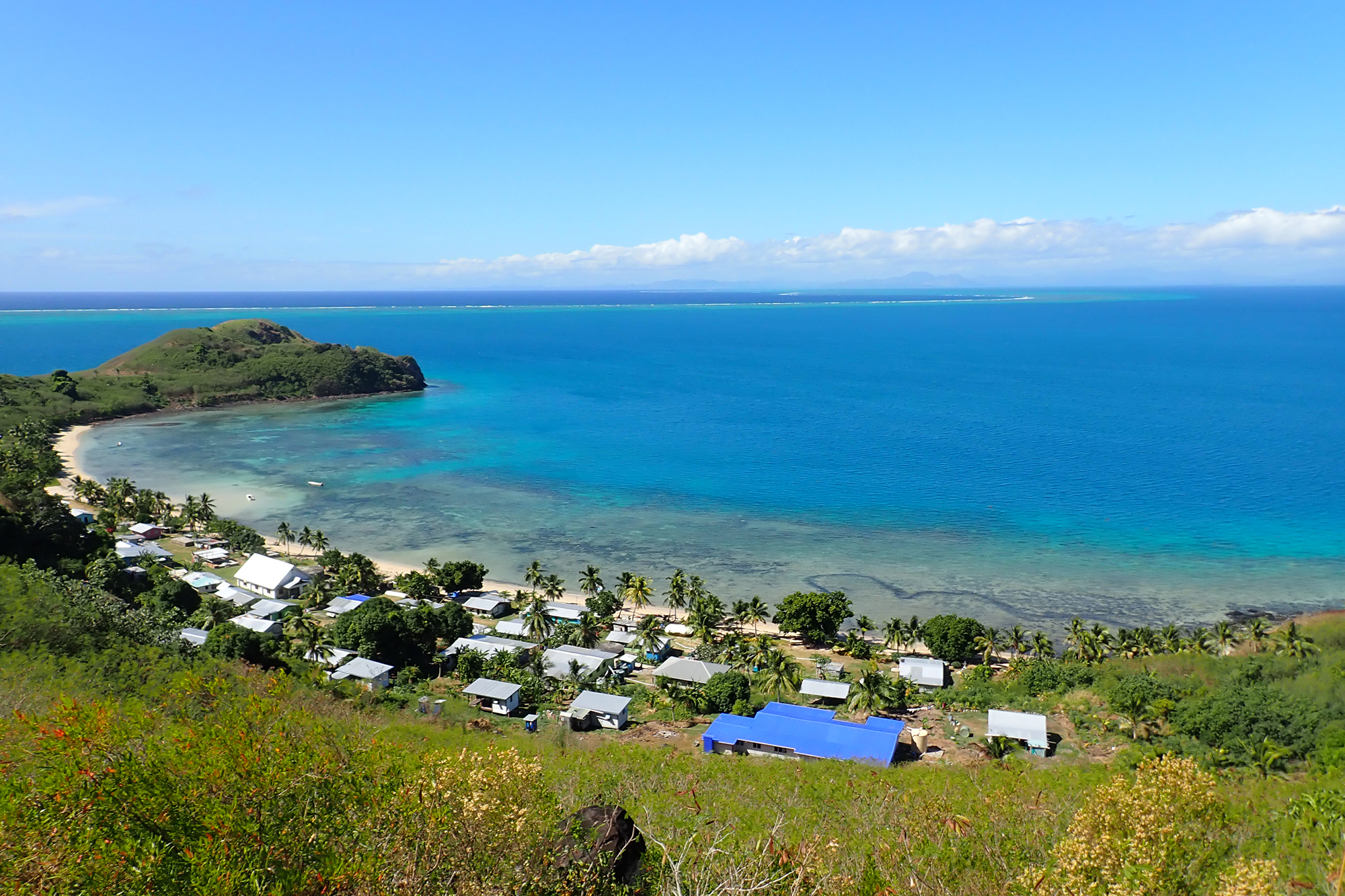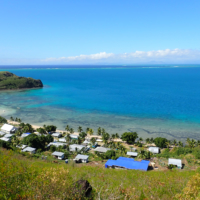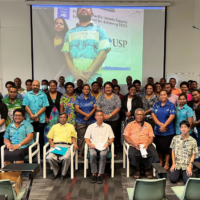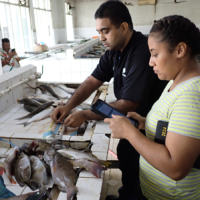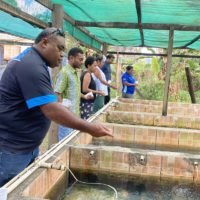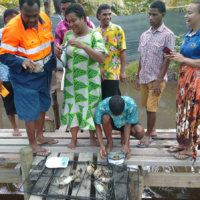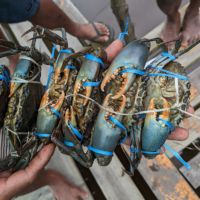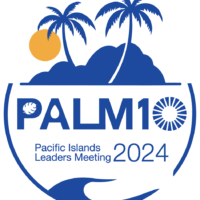In a world increasingly concerned with environmental sustainability, Japan is making strides in helping the Pacific island countries achieve U.N. Sustainable Development Goal 14 (Life Below Water).
This goal, part of the United Nations 2030 Agenda for Sustainable Development, focuses on the conservation and sustainable use of oceans, seas and marine resources. Through the Project on Pacific Islands Capacity Enhancement for Achieving SDG 14, Japan is fostering human resource development in the Pacific region to address pressing challenges in the fisheries sector and promote sustainable marine resource management.
Background and objectives
At the Pacific Islands Forum in 2016, Oceania’s leaders reaffirmed their commitment to ocean conservation. The following year, the United Nations Ocean Conference, co-hosted by Fiji and Sweden, highlighted the urgency of placing SDG 14 at the top of the global agenda alongside climate change.
Despite these high-level commitments, practical implementation at the working level has faced significant challenges due to limited human and financial resources. To address this gap, the Japan International Cooperation Agency took the lead in launching the aforementioned Project on Pacific Islands Capacity Enhancement for Achieving SDG 14, aiming to support the Pacific island countries in developing human resources to foster proactive and effective activities toward achieving the goal.
The Management Plan of the Ministry of Fisheries in Fiji (2020-2021) outlines four primary goals: economic development through offshore fisheries, conservation and management of coastal fisheries resources, food security through aquaculture, and quality improvement of administrative services. Human resource development is a common strategy across these goals. In line with this plan, the SDG 14 project promotes the active engagement of fisheries stakeholders in Fiji and other Pacific island countries to implement effective marine conservation and sustainable resource utilization practices.
Sustainable fisheries
The project is being executed in two phases. The first phase, initiated in 2021, involves observing the current situation and analyzing the issues and needs related to marine resource management in Fiji and formulating a strategic action plan. In collaboration with the School of Agriculture, Geography, Environment, Ocean and Natural Sciences at the University of the South Pacific, dubbed Sageons, and the Pacific Committee, the Ministry of Fisheries in Fiji, with support from JICA, developed a comprehensive training curriculum. This curriculum combines practical activities with essential knowledge and skills, ensuring that participants can apply what they learn in real-world scenarios.
Since 2022, seven small projects have been conducted under the SDG 14 project to apply the acquired knowledge in areas such as coastal resource management, aquaculture and fish processing. In 2023, the overall project’s scope expanded to include other Pacific island countries, facilitating knowledge exchange and collaborative training. This regional approach allows for the sharing of best practices and lessons learned, fostering a collective effort to achieve SDG 14.
One notable training session, held in February 2022 for the ministry’s staff, was co-organized by JICA, USP Sageons and the Pacific Committee. This three-week session provided theoretical knowledge in the aforementioned areas and included field trips for practical experience. Participants gained valuable insights into sustainable fisheries management, which they could immediately apply to their respective roles.
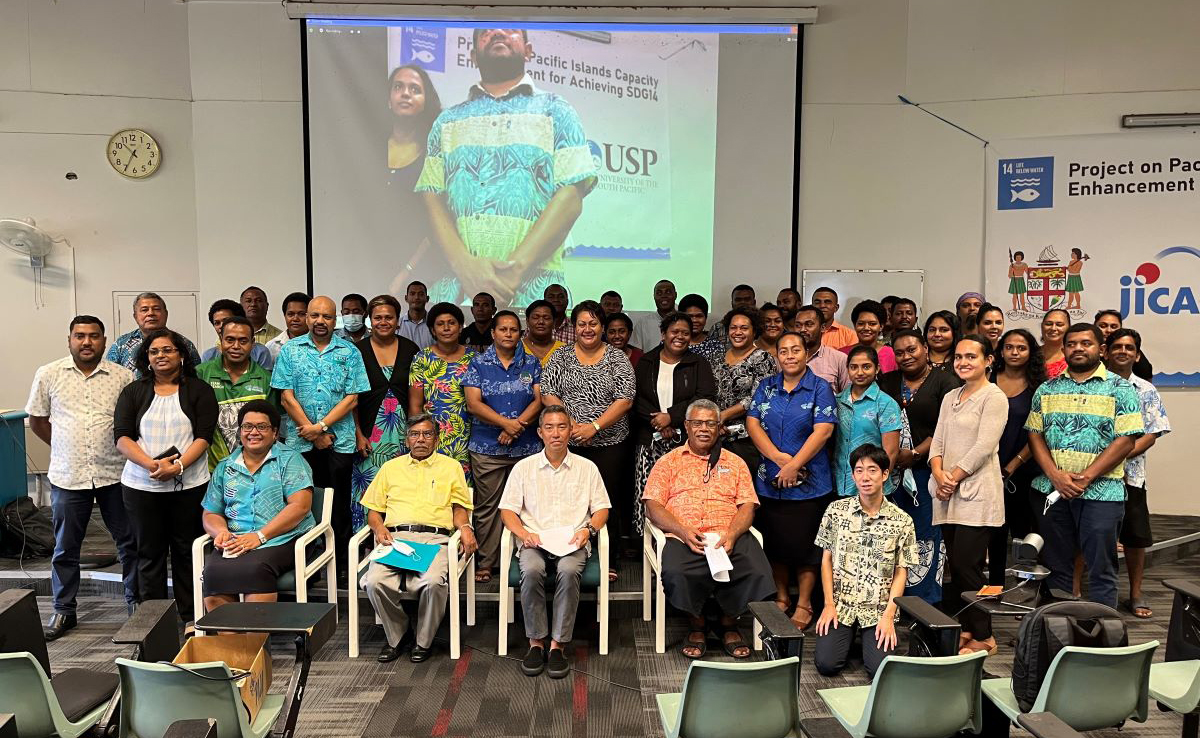
Navneel Singh, a senior fisheries officer at the ministry’s Inshore Fisheries Management Division and the main liaison for the SDG 14 project, said the project couldn’t have been launched at a better time.
“This project is very timely considering the severe impact of COVID-19 and other natural disasters on Pacific island countries.”
Addressing key challenges
According to Singh, Fiji’s fisheries sector faces several challenges, including inadequate data to make informed management decisions, lack of alternative livelihoods for fishers, poor postharvest handling and illegal fishing. Additionally, the impact of COVID-19 exacerbated all the other problems.
“When the borders closed due to the pandemic, many people, including those in the private sector, lost their jobs. As a result, they resorted to natural resources for livelihood, significantly contributing to the overharvesting of some of our resources,” Singh said. Thanks to the JICA project, Fiji’s fisheries officers are taking a series of training programs on how to address these issues, focusing on practical solutions that can be sustained over the long term.
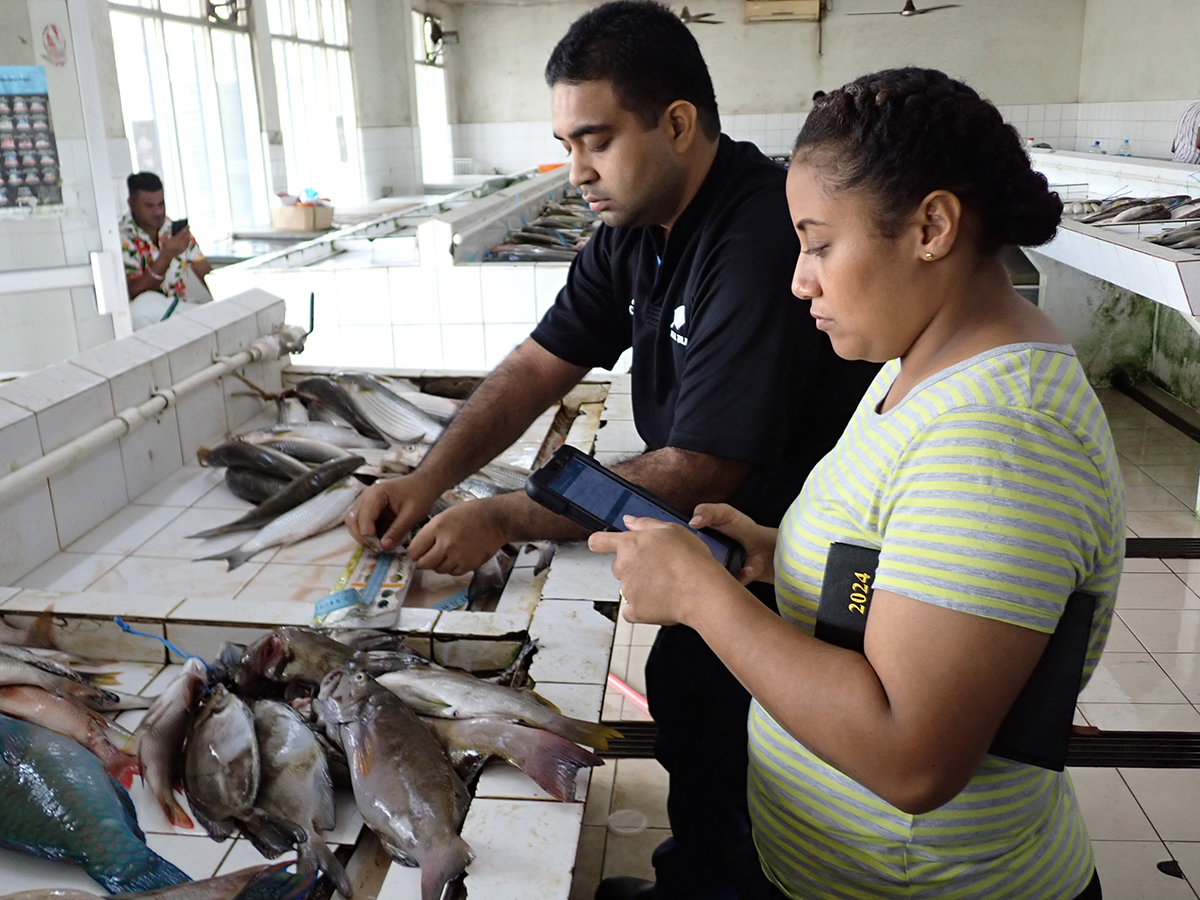
Singh explained that rectifying the lack of good data is one of the focuses of the project. To tackle this problem, Fiji’s ministry has improved its data collection processes, allowing better management decisions to be made on issues such as size limits for harvesting invertebrates and understanding breeding seasons for different commodities.
“Before the project, the ministry did not set any management measures for most of the invertebrate species, including seaweed, oysters, lobsters and freshwater mussels, resulting in severe growth overfishing,” Singh said. “By collecting and analyzing data, they can set more effective rules for sustainable marine resource management, ensuring that species have the opportunity to grow and reproduce.”
He also said that a further challenge is the lack of alternative livelihoods for fishers, especially considering restrictions and rules aimed at conserving marine resources. To mitigate this issue, the ministry has encouraged alternative livelihoods, such as tilapia aquaculture. For instance, the introduction of new strains of genetically improved farmed tilapia has significantly boosted productivity. Fiji will receive 20,000 of these tilapia fingerlings from the WorldFish Center later this year. Since they mature faster than local strains, the harvest period can possibly be dropped to four months from approximately six.
“This will make farmers very happy because now they have to spend much less time raising the fish before they can be harvested and gaining more income,” Singh added.
Another promising initiative is mud crab fattening, which targets the high demand and subsequent illegal harvesting of undersized mud crabs in Fiji. This small project focuses on the village of Vunuku, where fishing pressure on mud crabs in the mangrove rainforest is significant. Fishers often resort to catching smaller crabs than the legally prescribed size, leading to sustainability issues. In this regard, the project involves pilot farming of small mud crabs, equivalent to those typically caught illegally, to study their growth rates and cost efficiency.
In May 2022, the SDG14 project team, in collaboration with the Fiji Ministry of Fisheries Central Division staff and Rajesh Prasad of USP, conducted a workshop in Vunuku. The workshop educated community members on proper fattening methods, including keeping, feeding and weighing the crabs. Three different groups were tested to find the best feed, with one using tuna processing plant waste, another using vegetable scraps and a third using a mix of both.
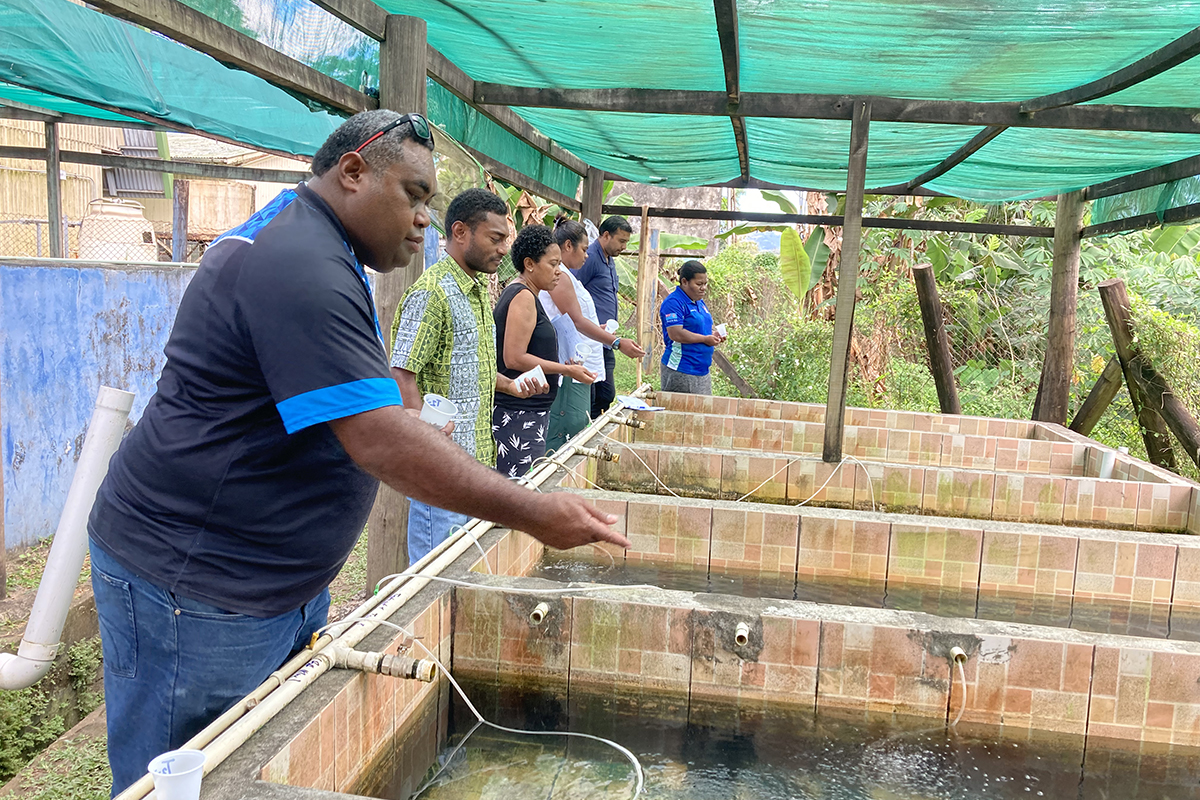
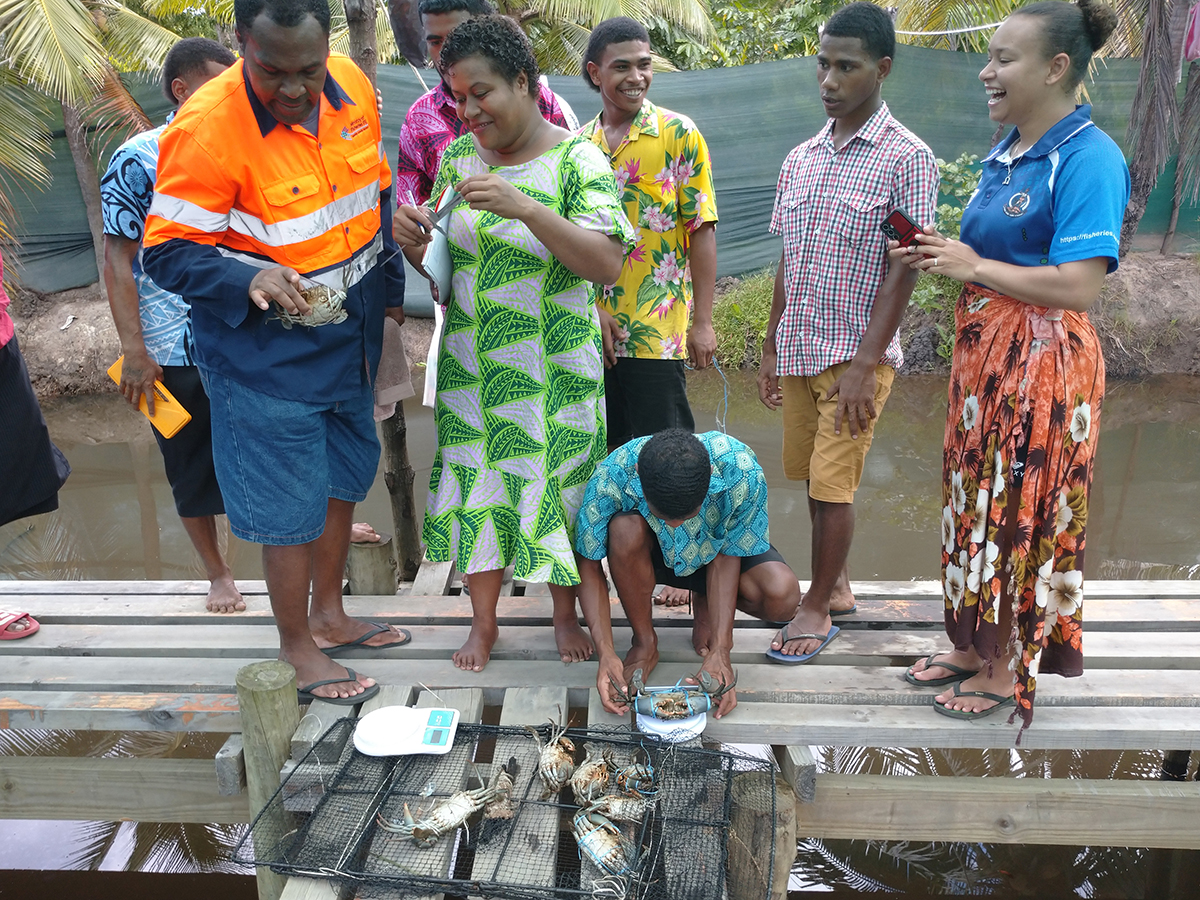
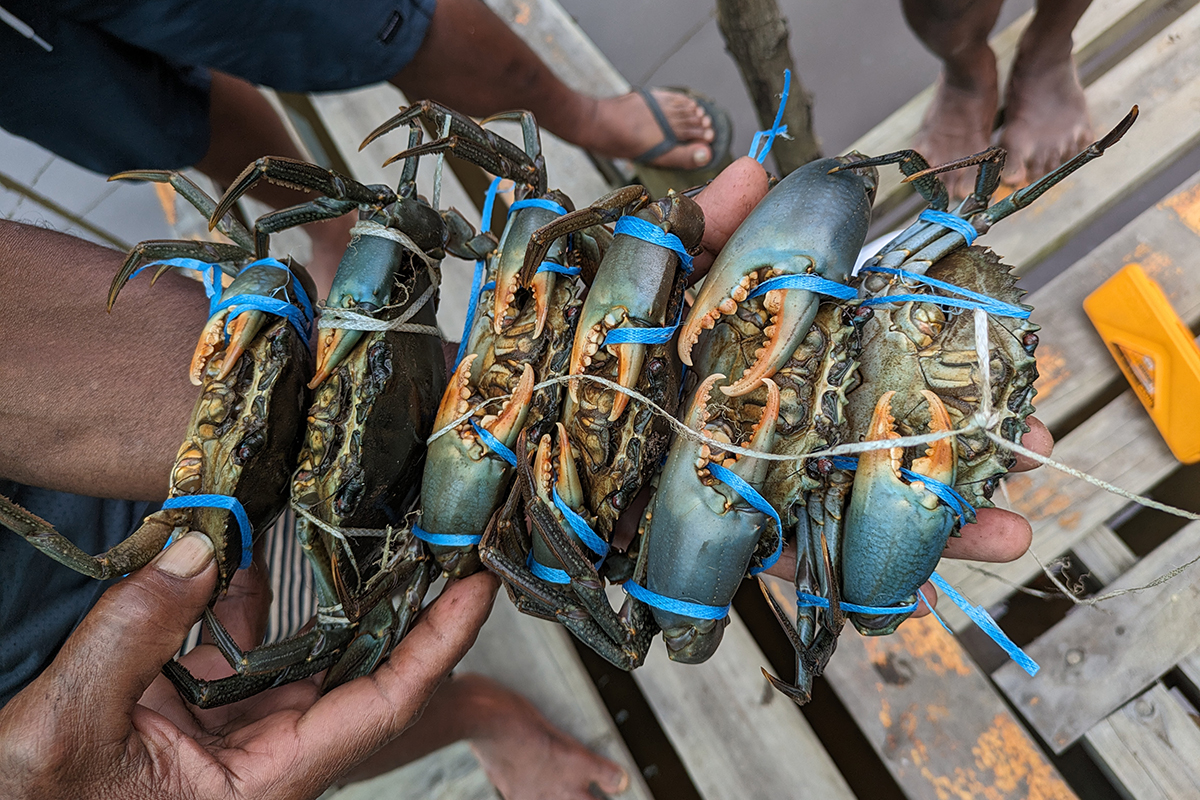
Subsequently, from Jan. 25 to 27, 2023, Prasad led a training session for 15 of his staff and two community members from Vunuku. This training included lectures on mud crab fattening methods and the importance of resource conservation. At the same time, Prasad and JICA experts conducted workshops in western and northern Fiji until March 2023, addressing overfishing and illegal fishing impacts while promoting sustainable farming practices.
The mud crab fattening project has proven effective in increasing their size, and the ministry continues to monitor its progress. “This initiative has provided fishers with an alternative source of income to reduce their reliance on overfished marine resources,” Singh explained.
Illegal, unreported and unregulated fishing is yet another pressing issue. The project has taken steps to combat IUU fishing by improving enforcement with a focus on marine products from coral reef areas such as reef fish and lobsters.
According to Singh, JICA helped the ministry set up a watchtower on Kia Island on June 11 to enhance surveillance and control of fishing activities in the region. This initiative is also expected to foster multi-sectoral collaboration in the proper recording and reporting of incidents, ultimately leading to a reduction in IUU fishing.
Postharvest handling is also a critical area of focus. Improper postharvest handling can result in significant economic losses for fishers.
“The project has provided the fishing association with training and equipment to improve the quality and hygiene of their catch, increasing their economic returns,” Singh explained. He also said there are plans to support the sale of processed marine products, such as smoked fish, creating value-added products that can generate higher incomes for fishers.
The project aims to sustain and expand the knowledge and skills gained through ongoing training and regional cooperation.
A vision for sustainable seas
“There is growing interest from other areas in Fiji to learn from this project and apply its best practices in their own communities,” Singh said. “As the project’s end date approaches next March, the fisheries ministry is expanding some initiatives to rural communities with limited access to the mainland markets, enabling them to learn from the project’s success and implement similar strategies in their own areas.” He also noted that the ministry is working to integrate these initiatives into the government program. To this end, they have established associations of fisheries cooperatives and provided boat engines and other resources to support expanded fishing activities. These continued efforts ensure that the benefits of the project reach more stakeholders, promoting sustainable practices across the nation.
Cooperation within the Pacific region is a vital aspect for the project’s future. According to Singh, Vanuatu is actively exchanging knowledge and skills with Fiji, but neighboring countries have shown interest in the project as well. In March, four officers from the Department of Fisheries of Vanuatu visited project sites in Fiji to learn from the challenges and successes of the initiatives. Regional seminars are also planned to provide opportunities for fisheries officers and communities in other Pacific island nations to learn from Fiji’s achievements, fostering a collaborative approach to marine conservation.
“In the Pacific region, we have similar resources, environmental factors and socioeconomic issues. We can easily learn from each other on how to manage our resources as a region rather than each country working in isolation,” Singh noted.
Future plans include sending participants to Japan to attend JICA’s Knowledge Co-creation Program, a form of technical cooperation that supports human resource development and issue resolution in developing countries. As a participant of the previous program held in Okinawa in October 2022, Singh recalled it as very informative. “Some of the skills and knowledge that we learned during training in Okinawa have been incorporated into the current projects,” he said. Many of the former participants are playing an important role in the SDG 14 project by using the JICA’s Project Cycle Management method they learned under that program. “This method helps us identify key issues and make proposals for small-scale projects that could bring significant or tangible outcomes to our communities,” he said.
Ensuring lasting impact
Sustaining the improvements and knowledge gained from the project is essential for long-lasting impact. The project will establish a road map for human resource development to promote sustainable practices. This road map includes ongoing training, regional seminars and continuous collaboration with various stakeholders, such as the U.N. Food and Agriculture Organization, the Secretariat of the Pacific Community, the Secretariat of the Pacific Regional Environment Programme, development partners and nongovernmental organizations.
The project’s emphasis on capacity building ensures that the benefits extend beyond the initial participants. By training fisheries administrators and other stakeholders, the project creates a ripple effect, where knowledge and skills are passed on to others in the community. This approach helps build a strong foundation for sustainable fisheries management in the Pacific region.
The path ahead
Through the Project on Pacific Islands Capacity Enhancement for Achieving SDG 14, JICA is striving to contribute to marine conservation and sustainable resource management in the Pacific region. The project’s focus on human resource development, practical training and regional cooperation addresses the critical challenges facing the fisheries sector in Fiji and other Pacific island countries. By fostering a collaborative approach and sharing best practices, the project aims to create a sustainable future for marine resources, benefiting both current and future generations.
Singh highlighted the importance of partnerships in achieving long-term sustainability. “We want to see improvements in the current status of our fisheries resources in the future so that our children, our grandchildren, our great-great-grandchildren and many more generations to come will have the same resources to see, appreciate and enjoy. And we can only do this through partnerships.”
Through continued commitment and innovative approaches, the Pacific region is on a path toward ensuring the sustainability of its vital marine ecosystems for generations to come.
This page is sponsored by the government of Japan.
